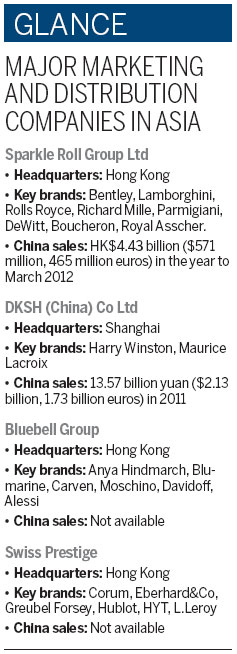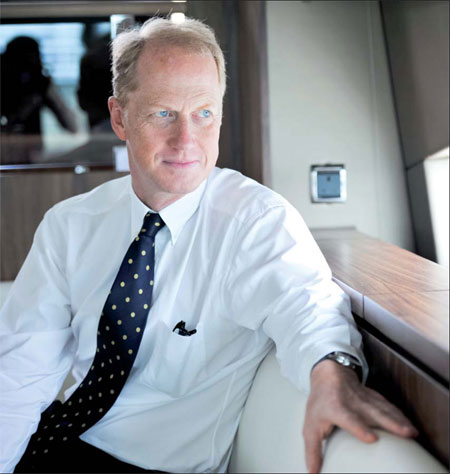Taking the high road to success
Updated: 2012-07-13 12:33
By Yao Jing (China Daily)
|
|||||||||||
|
Jebsen & Co's Helmuth Hennig says the Chinese mainland market will be an important growth driver. Provided to China Daily |
Jebsen banks on quality of services to sustain long-term growth in China
When the two cousins Jacob Jebsen and Heinrich Jessen sailed from Aabenraa in Denmark to Hong Kong and co-founded Jebsen & Co Ltd as a shipping agency in 1895, little did they realize that their trading company would become one of the main agents in Asia for a range of luxury products such as Porsche cars and Raymond Weil watches.
 |
Headquartered in Hong Kong, the marketing and distribution company, which also has sister groups in Australia, Denmark, Germany and the United States, has played a key role in connecting the West and East in consumer products, industrial products, beverages and luxury goods.
Rising costs, added competition, and a sharp fall in third-party arrangements from Western companies, however, have forced the Hong Kong firm to constantly readjust its market strategy. Jebsen is currently focusing more on the luxury sector out of its four major business units and at the same time looking to develop its own brand.
"The income from the 10 brands under the luxury sector, including cars, yachts and watches, accounted for two-thirds of our total revenue in 2011, which was HK$14 billion ($1.81 billion, 1.47 billion euros), compared with HK$11 billion in 2010," says Helmuth Hennig, the group managing director, who has been working with the company for about 30 years.
The car business is probably the most capital-intensive one, as the company needs to build showrooms and finance car purchases. The luxury watch business has also been strong, with annual growth rates of 15 to 20 percent in 2011.
Luxury products are the new stars in the Jebsen portfolio, dominated by industrial and consumer products some 10 years ago.
"In those days if we wanted to sell wine, we could only sell it to five-star hotels or high-end restaurants," Hennig says.
But with more consumers accepting Western products as part of their lifestyle, Hennig says the opportunity for developing the luxury business is just right.
The company's business focus has also seen a change from Hong Kong to the Chinese mainland, and more than 80 percent of the income comes from the new marketplace.
"The only way for us to grow the business profitably is by being active in the Chinese mainland. Hong Kong is a good market, but limited in scope," he says.
He adds that an 8 percent growth in the mainland business is more than sufficient for the company's long-term development.
Hennig, who chose to be interviewed in the Porsche Center located in Chang'an Avenue in Beijing, says that Jebsen was the sole distributor of Porsche cars in China between 2001-07.
Jebsen sold 6,662 cars in 2011, an annual growth rate in excess of 20 percent, across all its seven locations in China, including Shanghai, Shenzhen and Guangzhou.
Though the company is no longer the sole distributor for Porsche in China, it is still optimistic about the long-term prospects.
"There is a big difference in the market size now. Take the Beijing showroom itself as an example. We sold 40 cars in the first year when we were the sole dealers. However, the number rose to 900 by 2011, despite the presence of competitors," he says.
Hennig says the big challenge for the 117-year-old company comes from the decision by many Western brands to set up and manage their own units in China.
There has also been apprehension among Western companies whether it would make sense to outsource their distribution business in China to a company like Jebsen, and to whether the distributor can make profit for them over a longer period of time.
"Our added value is in trying to understand how to position the brand, how to move the brand forward, whether we understand that China is different from other global markets and whether we are able to translate that into something that allows the brand to grow faster and be more successful than its competitors," Hennig says.
He adds all things finally boil down to customers' shopping experience, and the likes and dislikes of individual customers.
"Furthermore, being in the marketplace for so long, we have a reputation of presenting all the products together and we also speak to the same group of consumers. Customers prefer to talk to us rather than the brand owners," he says.
When it comes to its standards in choosing brands, Henning says that all brands must be complementary. Conflict among brands is not allowed as Jebsen always looks for brands that serve different target segments in the same industry.
"For example, in the wine business, if we are already active in Italian or French wines, we must make sure that we don't bring in brands that would be in competition with them," he says.
The second criterion is the supplier support. Brand owners should be patient like Jebsen and be prepared to invest time, money and support, because it takes a long time to build a brand in a new market.
"The fact is that the competition in China is fierce. Every brand wants to be in China and consumers have a lot of choices. At this point, I think most consumers are not actually brand loyal. Most of them are still willing to try different things," he says.
Although the company continues to invest in its four sectors, it is looking to limit the product range because they are also competing with specialists.
"Very few people are as broad-based as we are. We need to be specialized in each of our product ranges," he says.
Apart from tailoring its distribution capabilities to the consumption demand trends in China, it is also developing its own brands. Jebsen owns more than 10 brands across various categories, with most of them in the beverages and wine business.
Vineyard in Australia and Blue Girl beer are two recent examples of this strategy. Blue Girl beer contributed more than HK$700 million to Jebsen's total revenue in 2011.
But the opportunity to build a brand does not exist in every category, and it always needs time, money and commitment.
"In other products, like technical brands, we stand no chance. The brands we are working with are probably the best we can get," Hennig says.
Still, the company remains cautious about bringing brands into the mass market. Usually, its own brands are started in Hong Kong because it is easier to test products in the smaller and easily controlled market. If it is successful, the company may extend the product to the mainland markets, he says.
Rising labor costs on the mainland, especially in the big cities, increased expenditure for the company by 10 percent in 2011, compared with just 5 percent in Hong Kong. Hennig says if the streak continues, Jebsen will have to improve the efficiency and the overall capabilities of employees.
In order to dig out new markets and save costs, the company will also take steps to branch out into untapped cities such as Wuhan and Xi'an.
Nevertheless, as a distributor, Hennig says the weapon for its success is "service, service and service".
"Thinking about how to translate all things to service and satisfy customers will continue be the core of our philosophy," he says.
yaojing@chinadaily.com.cn
(China Daily 07/13/2012 page22)
Today's Top News
Rescuers race against time for quake victims
Telecom workers restore links
Coal mine blast kills 18 in Jilin
Intl scholarship puts China on the map
More bird flu patients discharged
Gold loses sheen, but still a safe bet
US 'turns blind eye to human rights'
Telecom workers restore links
Hot Topics
Lunar probe , China growth forecasts, Emission rules get tougher, China seen through 'colored lens', International board,
Editor's Picks

|

|

|

|

|

|






